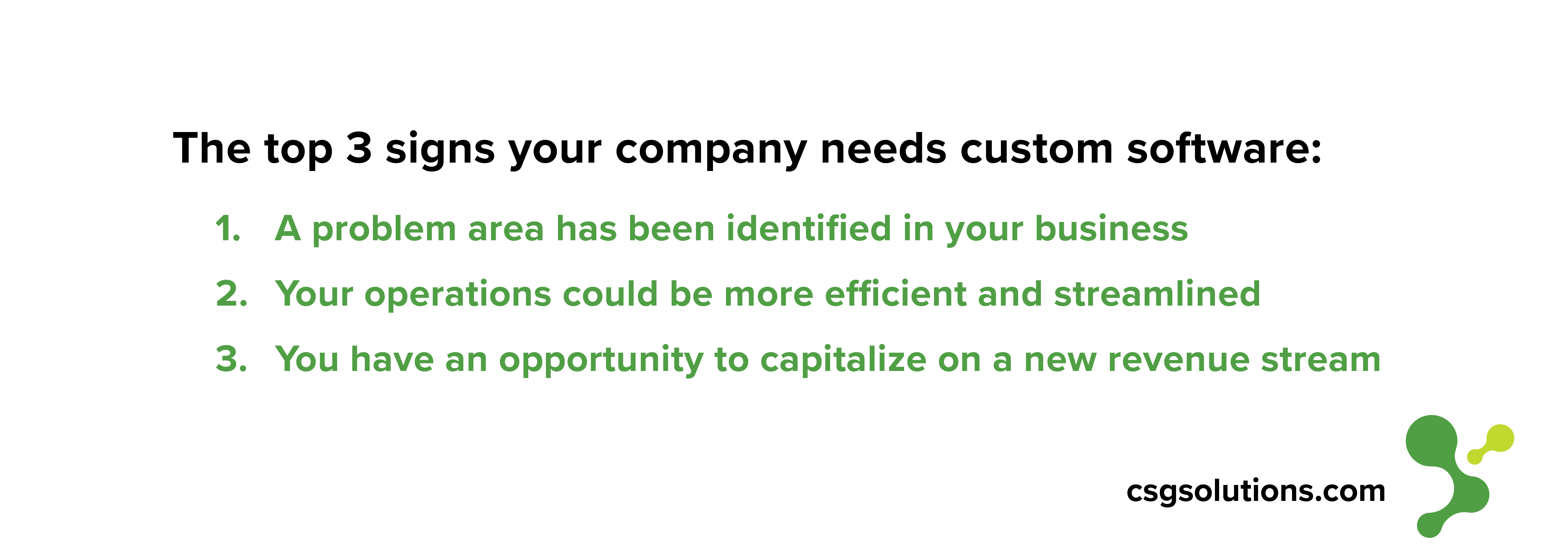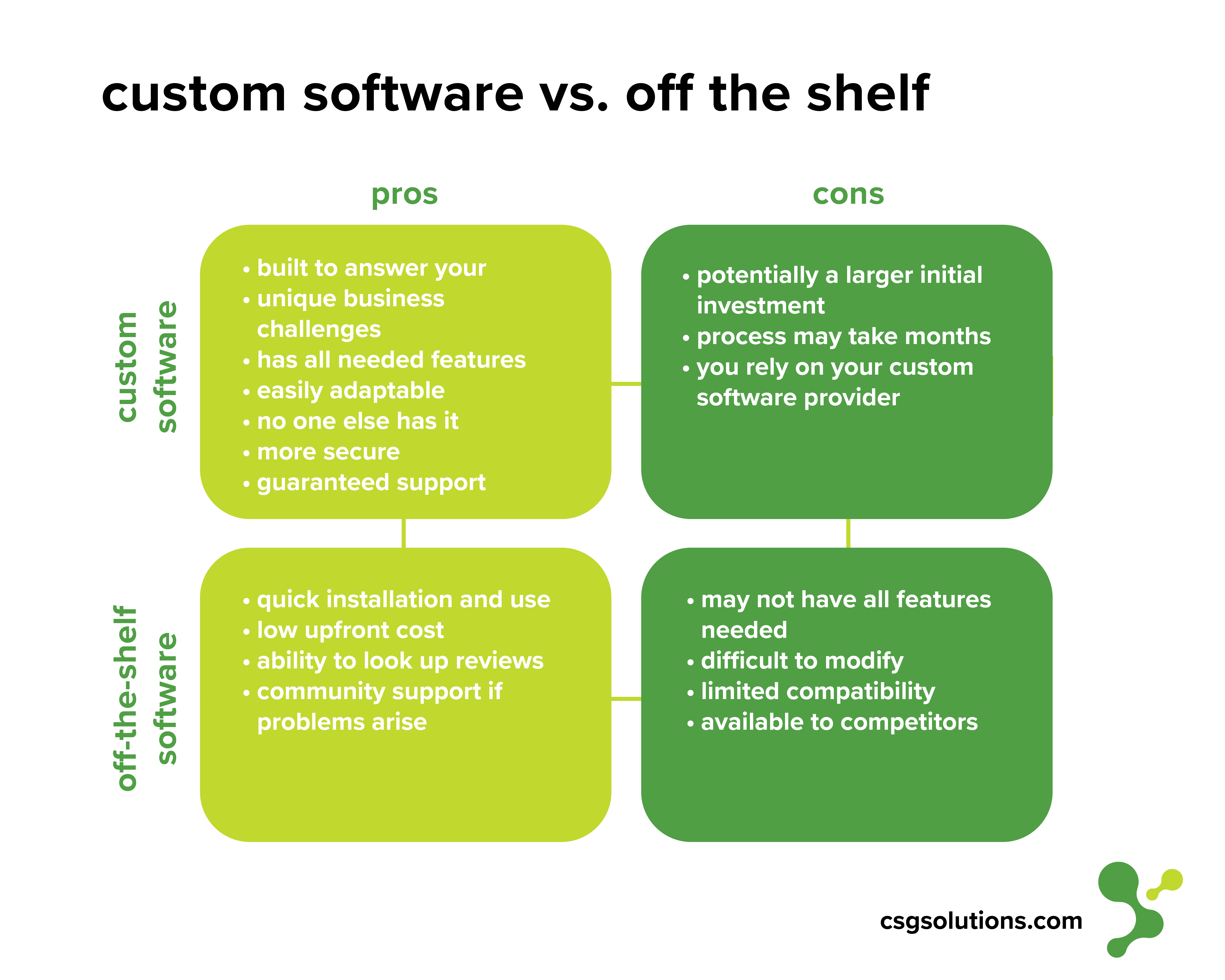Does Your Business Need Custom Software? Your Complete Guide
You may see a system or process in your business that could be streamlined, you may have a recurring task that is taking a lot of time and manual labor, or you see a recurring problem in your business that you want solved once and for all. Any of these reasons can drive business owners to look into custom software solutions. We created this resource to help you decide if custom software is a necessary solution for your company and, if so, what you need to do to be ready for the custom software design process.
Signs that Your Company Could Benefit from a Custom Software Solution:
- Recurring problems regularly require a lot of time or manual labor
- An area of your business is facing clear problems or has room for improvement
- Processes need to be streamlined
- Systems are too spread out and can’t easily coordinate (i.e. coordinating supply chain, operations, administration, and customer satisfaction)
- Noticed decline in efficiency and growth
- Opportunity to capitalize on a new revenue stream
- Current technology is outdated
- Managing your customer base is becoming more difficult
- A point of potential failure needs to be addressed and alleviated
- Creating competitive advantage is vital for your company

If any of these sound like your business, custom software could maximize your efficiency and eliminate headaches. Like any solution, custom software is an investment of time and resources, so let’s look at some pros and cons of developing a custom software solution.
Pros and Cons of Developing a Custom Software Solution
Pros:
- It is built for the unique challenges of your situation
Custom software will fit the unique needs of your business “to a T” and provides the most effective, optimal solution to your problem.
- It can have all the features you need
Custom software is designed to help the way you work, not define the way you work. All the features you need for your operations will be taken into consideration and planned into the solution, and you can even plan to release the most important features first for quicker impact.
- It can adapt as your company grows and changes
If you’re working with a custom software provider, they will be able to modify and expand the capabilities of your software after it is built. As your business or technology changes over the years, you have the ability to take your software with you, rather than having to find a completely new solution
- No one else has it
If you build a custom solution, your competitor won’t have it. In fact, they can’t. It’s built for your business only so only you can use it to get ahead. If the software is well-designed, you should see efficiency increase and create that advantage fairly quickly!
- It is more secure
You control the software, so you and your provider can dictate how secure it needs to be and who has different levels of access.
- Eliminates the need for multiple apps
If you’re using multiple apps to coordinate your business processes, a custom solution can be all-encompassing, eliminating the need for extra apps and the fees that come with them.
- Support is close at hand
You won’t have to hope that support will be available and helpful. By working with an experienced custom software developer, support is close at hand and there to serve you. Better yet, a custom software provider fully understands the needs of your business because they fully explored your operations and processes in order to design the software. Their holistic understanding of your business is definitely a benefit and will provide long-term support, not short-term fixes and endless support ticket email exchanges.
Cons:
- Potentially larger initial investment
Most things that are customized are more expensive. Custom software has the potential to be more expensive than off-the-shelf, but only initially. The built-from-scratch nature and endless customization that is possible with a custom software solution does mean that you’ll likely be looking at a larger upfront investment. In the long run, though, the investment is rewarded with increased efficiency, problems eliminated, and increased profits as a result.
With custom software, you are investing in the growth of your business and alleviating problems that are going to hinder your growth later. The investment pays off. A subscription-based off-the-shelf solution may be cheaper in the long-run, but we guarantee it probably won’t work for years, and subscriptions are just that- an agreement that you’ll never stop paying for the software. If you need a long-term solution, custom software is the way to go.
- The custom software development process can take several months
If you need an almost instant solution, custom software might not be the way to go. On one occasion we built a custom solution in just one month, but it usually takes longer. To create a custom solution, you’ll be communicating with key stakeholders and users, allowing time for design, testing to optimize performance, and providing feedback. These steps are crucial to creating a truly all-encompassing, tailored solution, and we’d never deliver anything less. Off-the-shelf solutions often can be installed instantly but take a surprising amount of time to customize and implement, as they’re not built specifically for your business.
- You are dependent on your custom software provider
Building custom software means you’ll be working with your software provider for the long-term. If they were to fold or become unavailable for whatever reason, your business could be inconvenienced. Later on in this article we offer a few tips for selecting a custom software provider so you don’t end up with this problem. If you choose a reliable provider, the risk of being dependent on them is minimized. Plus, the benefit of having small-scale, specialized support usually outweighs this risk of dependency.

A note on off-the-shelf software: Off-the-shelf solutions are usually quick to install and use, have a low up-front cost, and offer you the opportunity to read reviews prior to purchasing, but they also may not meet all of your business requirements. The chance that you’ll be able to modify most off-the-shelf software to your business needs is slim, so if you’re looking for an all-encompassing solution, off-the-shelf might not be it. Off-the-shelf is a great solution in cases where you’re not using it to differentiate your business from competitors - i.e. if you need simple accounting software or software that doesn’t communicate inter-departmentally.
In many cases, short term pain will lead to long term gain.
Read our results story of how custom software strengthened one client’s relationship with their biggest customer, then set them up for increased efficiency for years to come.

Evaluate what your business will require from a software solution.
By now you probably have a hint of whether custom software is right for your company, so now it’s time to evaluate what you’ll need from your custom software.
- Identify the aim and desired outcome
What is the goal of implementing this new piece of software? What is its mission statement? Perhaps you’re hoping to be able to sell your goods efficiently online, or you want to make better strategic decisions through the use of business intelligence. Try to make the goal of the software as clearly defined as possible- this will aid in streamlining the entire process and will help any software provider make sure you get what you want.
Tip: Don’t put yourself in a box when you’re thinking of how the software could help. The endless capabilities of modern day software can provide a solution to just about any problem or goal. - Speak with key stakeholders
You’ll want input not just from leadership, but also from frontline employees who will be dealing with the custom software firsthand. Employees with direct relationships to your customers, end users, and IT personnel will provide some of the most valuable insights into what your solution should entail. Ask them what problems they most commonly experience or hear from your customers. Ask about their frustrations. These conversations will quickly show you where you can maximize efficiency and eliminate less-than-optimal customer experiences. - Compile a list of requirements
One you’ve spoken to your key stakeholders, come up with a complete list of requirements that your solution should be able to deliver. Once again, don’t put yourself in a box in this stage. If there’s a capability you’d like, include it. Leave it to your developer to let you know what’s possible.
Examples of requirements might be:
- Simple functionality and intuitive operation
- Access to comprehensive analytics across the organization
- Measurable ROI on the software’s performance - Prioritize your requirements
Which of your requirements is most important to you? This will be important for your custom software provider to know. Categorize based on “must have,” “nice to have,” and “no preference.” - Examine your current capabilities
What are the capabilities of your current business software systems? Should you look to include aspects of these systems in your new one? Custom software makes it possible to consolidate multiple pieces of software into one efficient program. Looking at your current capabilities will help you get a better sense of what you’ll need from a new solution.
Finding A Reliable Custom Software Provider
After you confidently know what problems the custom software will need to solve as well as your desired features, it’s time to find the perfect custom software provider. Like we’ve mentioned previously your provider will be integral in the long-term success and efficiency of the solution. Doing your research in this stage is well worth it. Here are a few tips for finding the right custom software provider.
Choose your provider based on what type of solution you need
Many custom developers work within a specified niche. If you’re looking to have a mobile app developed, you will most likely need a different developer than if you’re in need of a custom reporting software or a data analytics solution. Consider what type of software you need, what services and experience each developer brings to the table for your needed solution, and then choose accordingly.
Keep in mind that if you’re looking to develop custom software that will be in need of constant attention and updates, you’re going to need to make a connection with someone that focuses on long-term solutions. Look for an established company with lots of experience and cutting-edge development skills.
A good custom software provider should display an interest in getting to know your company
If the prospective partner doesn’t display a sincere interest in getting to know your company, thoroughly understand your requirements, and ask enough of the right questions, they’re probably not the right partner for you.
Anyone who says they know exactly what you need at your first meeting is wrong. They’re not mind readers. If they say this, there’s a chance they’ll assume what you need in a custom solution rather than creating one that perfectly fits the needs of your business. If they’re not interested in finding out what positions you uniquely in the market, they’re not uniquely positioned to serve you in this initiative! Going with a provider like that throws your competitive advantage out the window. Instead, make sure they’re asking questions about how this custom software will affect your day-to-day operations and goals in a detailed, thorough manner.
Make sure they’re concerned with user experience (UX)
If you’re looking for a custom software solution that your customer will be affected by or that employees are expected to use on a regular basis, it shouldn’t be a hassle to use. Any provider you meet with should ask and advise on the end user experience to ensure that people actually want to use the custom software or app after you’ve launched it.
Explore their results and case studies
Explore a potential providers’ website and look for previous results. How have their solutions transformed processes previously? Have they worked with clients in your industry before? What results have they seen with previous clients after launching the solution?
Experience may determine cost
Cost is a consideration for any business when considering a custom software solution. Keep in mind that a provider with a smaller portfolio might be a bit cheaper, whereas those with a long history of experience creating complex solutions will be more expensive. If the solution needed is fairly simple, you could save by going with a provider that has a smaller portfolio but a good track record. But if you’re looking for a complex solution that has a high potential ROI or that the success and growth of your business is hinging on, going with an experienced custom software provider would be more valuable in the long run.
If you’re looking for a custom software provider, csg would be glad to assist you. Check out our results page on our website to see how we have helped companies gain an advantage with custom software.
What Does the Custom Software Development Process Entail?
What should you expect from the custom software build process? Each provider may go about it differently based on your timeline and how involved you’d like to be in the development process. Most businesses use either the Waterfall Method, the Agile Method, or a combination of both. From any design process you can expect an initial stage of defining your requirements for the solution, designing, opportunities for feedback and testing, and quality assurance testing.
At csg, we use the agile approach, where your solution is developed feature by feature, rather than all features being developed simultaneously. We start by fully exploring your business needs and the problem you are trying to solve, and then we propose a solution with features that are custom-fit to answering your business’s needs. We’ll discuss which features are the most necessary or time sensitive for your business and those will be developed first.
This iterative approach to development allows you to test and assess the most important features of your new solution sooner rather than later, so that adjustments can be made along the way. You’ll see the impact of your solution sooner, and you’ll easily be able to reassess what features are needed after you’ve tested each iteration.
Learn more about our agile approach here.
Whether that be in the form of an opportunity to streamline your operations or want to stand out from your competitors, you’ve identified an area of your business that has room for improvement. In order to create this improvement, you’ll need a capable piece of business software.
Take a deeper look at the custom software development process.
Read our post about the agile method for software design.


